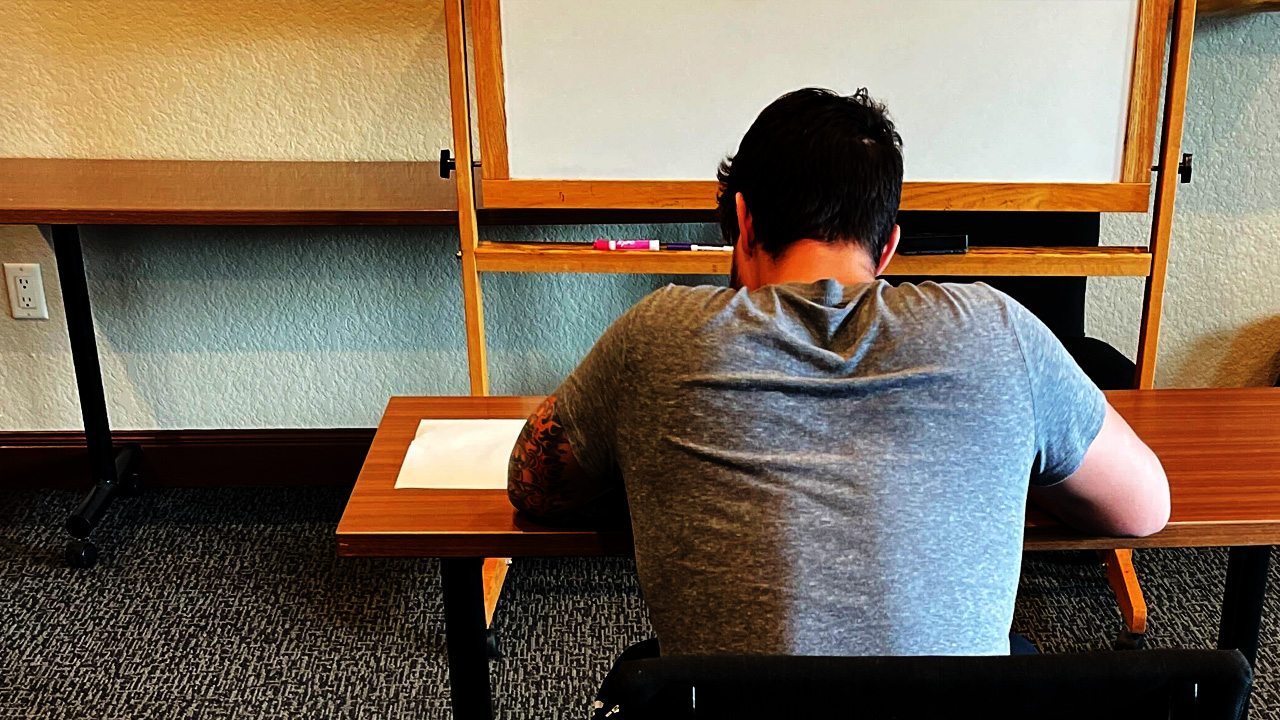90 Days in Recovery Can Make All The Difference – Through Their Eyes
Warriors Heart Recovery Why 30 Days Isn’t Enough for Lasting Sobriety
Short-term rehab can be a crucial first step, but it often lacks the time needed to build habits, reset brain chemistry, and establish meaningful change.
Connley’s Story: A Veteran’s Journey to Long-Term Recovery
Connley* abused alcohol and prescription drugs after he was medically retired from active duty. It wasn’t until after several arrests on drug-related charges, that he was forced to enter a 30-day treatment program; the first of what would be many stays he would experience over the course of 10 years.
Why 30 Days Isn’t Enough for Lasting Sobriety
“30 days would go by, I’d be clean as a whistle, I’d get out and go right back to the same friends and old routines. There was no accountability – no one being that voice in my ear.”
At one point, Connley, was able to maintain his sobriety for nearly 4 years, until he got a call that one of his former teammates has taken his life – and he relapsed. He went on a tirade though his small town, and at the end of it, ended up in restraints in a hospital psychiatric ward. He knew he was in dire straits, and he pleaded for them to let him stay. “If I left after another 30 days in, I was going it die. I knew it.”
Following the standard 30-day inhouse detox program, Connley was then entered into a 6-month sober-living program.
“During that time, I truly was given a chance to get on my feet the first and get used to being sober – away from the people I used to associate with. It was such a freeing feeling.”
Connley’s story is one that the team at Warriors Heart sees often. However, the biggest struggle is convincing addicts or their family members that the extension of 45 to 90 days of treatment offers the best chance of success.
“We, as a society, love quick, no-mess solutions – the easy button,” stated Lisa Lannon, co-founder of Warriors Heart. “With health and wellness, we are particularly impatient of the time it takes to achieve our goals. But in the case of drug and alcohol dependence, it has become profoundly evident over the years that the “easy button,” just isn’t the answer.”
Warriors Heart offers a Full Continuum of Care, which includes Detox, Day Treatment, Residential Treatment and Training Programs , Intensive Outpatient Program (IOP), Sober Living (60-day minimum), Aftercare – and now the new Program to be able to assist more Warriors to include extensions and minimizing any waiting list.
Warriors Heart CEO/Co-Founder Josh Lannon explains, “Addiction did not happen overnight, and neither will the healing.
Many short-term programs do a good job of opening the wounds up, but do not have the time required to clean and heal them. Healing the body, mind and spirit takes a stable environment, routine, and consistency. Our new extended program provides our warriors with more to come home whole again.”
Scientific Backing: Why Extended Rehab Works
Increasing evidence has shown that the longer the treatment, the better the chance of sobriety becoming a lasting lifestyle.
Deciding between 45-day vs. 90-day addiction treatment can be unnerving. The decision to seek treatment does not come easily. For many of the men and women who come through the gates at Warriors Heart, it is a choice arrived at only when they have run out of other options and realize—often painfully—that they need more.
Research published in 1999 by Bennett Fletcher, a senior research psychologist at the National Institute on Drug Abuse, has shown that anything less than 90 days tends to increase the chances of relapse. “Longer treatment reflects the fact that addiction is a chronic, relapsing disorder,” says Lisa Onken, chief of NIDA’s behavioral and integrative treatment branch.
Specialized Treatment for Warriors, by Warriors
Additional time in treatment allows people to learn to handle stress, develop ways to cope with environmental cues that could trigger drug use and improve relationships that are needed to sustain healing.
High-functioning professionals, such as the Warriors who come to Warriors Heart, tend to require longer stays because they have often abused drugs for many years in secrecy and feel shame.
Military (both active duty and veteran), first responders and law enforcement have very different life experiences from the rest of the population; facing unique physical, emotional and mental health demands. These exceptional circumstances oftentimes lead to issues with Substance Abuse Disorders and chemical dependencies, as they provide temporary feelings of relief or self-medication for stress, trauma and PTS symptoms.
There is a well-known saying among veterans and first responders, “The only one that knows what a soldier is going through is another soldier.”
Warriors Heart is a place where that mentality, warriors helping warriors, resides in the hearts of every member of the team.
Other warriors and team members personally connect with those who have reached a point in their life where they think they have nothing to live for; showing them that strength is found in this unique facility, that simply and truly believes in the power of the warrior community, the power of each client that walks through the door of Warriors Heart and the power of each graduate who proudly emerges through the gates after graduation.
Healing Doesn’t Happen Overnight, Give Yourself the Time You Deserve
At Warriors Heart, we understand that long-term healing requires more than a quick fix. Our extended 90-day programs are designed specifically for warriors, military, veterans, and first responders, who need a structured path to lasting recovery. Detox, treatment, sober living, and aftercare come together to provide the time and tools for deep, meaningful change. If you’re ready to start healing, connect with Warriors Heart through our Contact Us page or call today.
Please contact Warriors Heart’s 24-hour hotline (844-448-2567) answered by warriors and/or visit https://www.warriorsheart.com.














